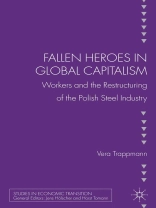Through the prism of ‘Nowa Huta’, a landmark of socialist industrialization, Trappmann challenges the one-sided account of Poland as a successful transition case and reveals the ambivalent role of the European Union in economic restructuring. An exemplary, suggestive case of multi-level analysis research.
Table of Content
Introduction PART I 1. The Steel Sector in the Global Economy 2. The Context of Restructuring in Poland 3. Capitalism Unleashed? The EU as a Promoter of Economic Change in the Region PART II 4. The Polish Steel Industry before and during Accession 1990-2006 5. The Embeddedness of Steel Restructuring in Social Dialogue 6. Labour-market and Regional Policy PART III 7. From Socialist Landmark to Subsidiary: the Case of Huta Lenina 8. Limitations of State Support for Sustaining Steel PART IV 9. Fallen Heroes: Steelworkers in the New Capitalist System 10. Perspectives for the Community: Revitalising a Region from the Bottom Up Conclusion
About the author
Vera Trappmann is Junior Professor of Sociology/European Societies at the Otto-von-Guericke University in Madgeburg, Germany. Her recent books include Business leaders and New varieties of Capitalism in Post-Communist Europe (Routledge, 2013) and Das Erbe des Beitritts. Europäisierung in Mittel- und Osteuropa (Nomos, 2006).












